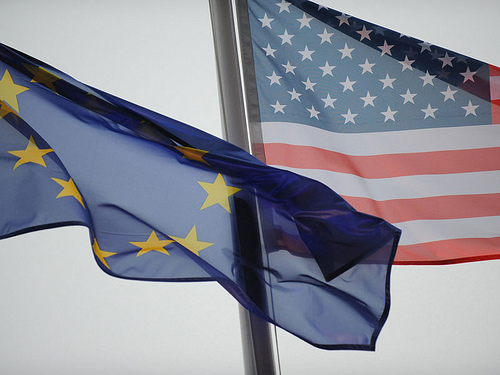
Russia celebrates the 50th anniversary of manned space flight while Libya, the finances of Portugal and Iceland, and terrorist attacks keep most of Europe grounded.
HEADLINES:
Lukashenko Blames Foreign Forces for Subway Blast (Spiegel)
An explosion in a subway station in Minsk has killed 12 people and injured 149. Belarusian President Alexander Lukashenko has warned that foreign forces could be behind the apparent terrorist attack. The Belarusian pro-democracy opposition is already fearing a crackdown.
Dark horizons for bailout Portugal (Publico)
IMF anticipates austerity effects and predicts recession and unemployment record for 2012", Público headlines as experts from the European Commission and the IMF – already in Lisbon – fix the terms of the bailout with Portugal’s government. According to their figures, Portugal faces an economic contraction of 1.5% in 2011 and 0.5% in 2012, while unemployment is set to reach 12.4% in 2012. Público adds that Portugal’s economy is set to be the worst performing in the EU in 2012, while Greece and Ireland will already be on the way to recovery. According to the Lisbon daily, the EU and IMF experts’ “biggest preoccupation” will be with reform to employment rules, tenancy agreements, and cutting expenses in the judiciary, noting that Portugal might "pay less for the rescue package than Ireland and Greece. (Full Article in Portuguese)
Netherlands: ‘No way now for Iceland to join EU’ (EUobserver)
Mixed messages on the status of Iceland’s EU accession application are coming from different actors in the bloc. But the Netherlands has said that after the country’s second rejection by referendum of an agreement intended to resolve a bitter banking dispute between the Hague and the small island, there is now "no way" Iceland will be able to join the European Union.
Libya: Nato must do more, say France and UK (BBC News)
Nato must do more to destroy heavy weaponry used by Muammar Gaddafi’s forces in Libya, the French and British foreign ministers have said. Libyan civilians remain at risk, France’s Alain Juppe said, despite the ongoing Nato-led bombing campaign. The UK’s William Hague urged Nato allies to intensify military operations, but a Nato general said the alliance was "doing a great job".
EU intelligence bureau sent officers to Libya (EUobserver)
The EU’s intelligence bureau, the Joint Situation Centre, has recently sent people to Libya. But its new director says there is little prospect of turning it into a genuine intelligence-gathering service even in the "long term."
Speaking to EUobserver in the European Parliament in Brussels on Monday (11 April), Joint Situation Centre chief Ilkka Salmi confirmed that one of his staff accompanied a European External Action Service (EEAS) fact-finding mission to Tripoli on 6 March and that another one took part in a visit to Benghazi on 5 April.
Medvedev says time nearing for presidential decision with Putin (RIA Novosti)
Russian President Dmitry Medvedev says he and Prime Minister Vladimir Putin will decide within a "fairly short time" which of them will run for president next year. "The decision will be made in a fairly short time because…there is less then a year left [until the election]," he said in an interview with Chinese state television broadcast on Tuesday. Medvedev said he and Putin had good relations and reiterated that their decision would be based on the existing social and political situation in the country.
Space exploration remains priority for Russia, Medvedev (BBC News)
Space exploration remains a priority for Russia, President Dmitry Medvedev has said, as the country marks the 50th anniversary of the first human space flight by cosmonaut Yuri Gagarin.
EDITORIALS AND COLUMNS:
The next European crisis: boat people (The Economist)
For the past year excessive sovereign debt has endangered the European project. For the coming year it may be north African boat people who present the greatest danger to European unity.
Will the Libya intervention bring the end of NATO? (The Washington Post)
When Western leaders talk about the Libyan campaign as a “NATO operation” they are, at the very least, being economical with the truth.
Think about it: There was no NATO discussion of the operation, no debate, no vote, no joint planning. Technically, the North Atlantic Treaty Organization operates only in the wake of an attack on a NATO member. The war in Afghanistan followed such an attack and was, in the beginning, widely perceived as a war against a common enemy. Libya is different: There was no attack, there is no common enemy, and now there is no consensus.
Image: transatlantic.jpg
